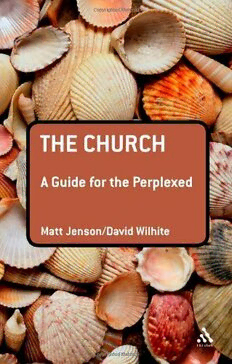
The Church: A Guide for the Perplexed PDF
260 Pages·2010·1.214 MB·English
Most books are stored in the elastic cloud where traffic is expensive. For this reason, we have a limit on daily download.
Preview The Church: A Guide for the Perplexed
Description:
Ecclesiology dominated the twentieth-century theological scene as Christians in the pew, pulpit and classroom sought to consider the implications of new realities within the church (such as Pentecostalism and ecumenism) and outwith the church (such as secularism and religious pluralism). Much has been written, and it is difficult to navigate between breezy generalities on the one hand or arcane specificities on the other. This is, in part, a function of the very real perplexities that plague – or, as the case may be, enrich – a full-orbed understanding of the church. This book serves as a rigorous comprehensive introduction to the doctrine of the church by taking the tack of walking readers through the internal logic of ecclesiology. Rather than simply offering a compendium of perspectives on each issue that arises, Jenson and Wilhite seek to teach and model thinking theologically, with the grain of scripture and ecclesial reflection, about the church. The overall structure is roughly systematic. Instead of a historical half followed by a constructive one, they take a broadly systematic approach that richly integrates insights, challenges and concerns from the history of the church. The chapters are peppered with excurses in which they pause to consider a particularly pertinent issue that arises from the doctrine’s development (e.g. the move from Jesus to the church, the role of the bishop) or contemporary concerns (e.g. women in ministry, the status of Christendom). While the overall tone and content of the book will articulate and invite discussion on the problematics of ecclesiology, these excurses provide ample opportunity to examine and (where appropriate) untangle ecclesiological knots.
See more
The list of books you might like
Most books are stored in the elastic cloud where traffic is expensive. For this reason, we have a limit on daily download.
